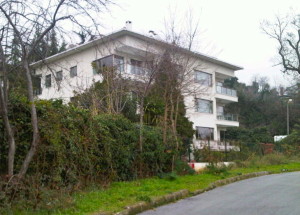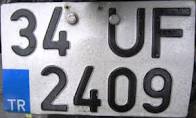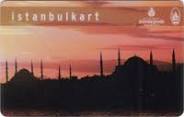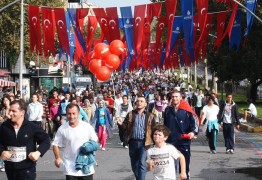Dear readers, A bunch of you have asked me where I am currently. I’m home in Minneapolis, Minnesota. Through this site I am blogging about the years I lived in Istanbul: 2010 through 2013.
A weekday afternoon in late October. I’d spent much of it sitting in the green armchair next to our east window, reading and watching ripples on the Bosphorus. The temperature was in the sixties, but the stiff breeze wafting in from the balcony seemed a portent of upcoming winter.
We had finished buying what we needed to furnish our apartment, our final purchase a couple of 6 x 9 kilims for the living and dining rooms. I had just started a new Turkish class, this time with helpful teacher Ferda. Monica was in my class again, along with four Japanese matrons and a young Polish woman. My book group had settled into its new reading list. My life here was still a thin broth, but it was gradually getting richer.
I put my book down and stood up. Then I began to tidy the apartment. I loaded the dishwasher and put some clothes in the wash. I emptied wastebaskets. Then, garbage bag in hand, I headed downstairs and outside to the metal dumpsters that sat across the street, Yalı Sokak (waterside street) from our building.
The door to our unit locked automatically. I usually left it ajar for brief trips downstairs, but a breeze could blow it shut. The door to the building also had an automatic lock, but it could be propped it open with the doormat. Still, whenever I left our apartment, I carried my house keys.
A tall chain link fence enclosed our complex. A black metal access door was built into it. For some reason this door was never locked. From the outside, you simply pushed it open. From inside, you pulled. Sema and Pinar, the longest residents of the building and the go-to folks for any concerns, obviously felt two layers of security were enough.
I pulled the black metal door open, crossed the road, lifted the lid of the dumpster, and tossed in my bag of garbage.
Then I walked back to enter the complex. I pushed on the metal door, but oddly, it resisted, so I pushed again. It wouldn’t open. To my surprise, it seemed to be locked.
How could this be? This gate had been unlocked every time we’d used it in our four and a half months here.
Perhaps one of my keys would work. I pulled them out of my pocket and tried one, and then the other, in the small unused-looking keyhole. No luck. I stood, dumbfounded. What should I do?
I tried my keys again. The door wouldn’t budge.

It was just before 3 pm. Sankar wouldn’t be home from work until 7 or so. I didn’t have my cell phone with me so I couldn’t call and let him know what had happened. Nor could I call and ask Ümit to come and help out. I was wearing flip flops and had no money on me, thus a walk down the steep hill to wait at Starbucks wasn’t a good option. The air was getting colder.
Could I climb over the door? Its smooth surface didn’t look like it would allow purchase. Furthermore, stretching either direction along the top of the surrounding fence were silver coils of razor wire.
I noticed some ivy growing just to the left of the metal door, and pushed it aside. Now I could see a twin black metal door, this one bolted in place. There were eight or ten buttons on it, lined up vertically. I’d never seen them before. Our apartment’s intercom system was located inside, next to the building door itself. For each tenant there was a nameplate and a button connecting to the appropriate apartment. These outside buttons looked like an older system.
I decided to try them anyway. I pushed every button on the console, moving from top to bottom and then back up again. I heard no sound, and couldn’t tell whether they were working or not.
Was anyone else at home? When Sankar traveled, I was sometimes the only one in the building. Aylin, on the first floor, was a divorcee with teenaged twin daughters in boarding school and a second home in Switzerland. Sema and Pinar were often traveling: to Bodrum, Turkey’s playground for the wealthy, to their second home in Florida, and even, recently, to Argentina. Their son, Can (John), lived on the first floor, but his apartment was undergoing renovation and I didn’t think he currently occupied it.
Nilufer and Erdi, a retired couple, lived in the third floor apartment opposite ours. They were often around, but I knew they had a son in the States who they visited. A carefully-groomed, well-dressed woman in her late sixties, Nilufer had stopped in one day to introduce herself, saying she and Erdi would like to invite us over for dinner. All of the residents spoke good English.
Our neighborhood, referred to as Kortel Korusu, Kortel’s grove, was full of three- to five-story apartment buildings, but we didn’t know a soul in any of them besides ours, not even by sight. Down the hill from us, facing the Bosphorus, were a series of lavish houses, some with front offices staffed by guards. Only the wealthiest İstanbulus lived in private homes. Asking residents—or employees—of these homes for help didn’t seem like a good option.
More pushing buttons. More silence. I looked around. What a stupid dilemma. And here I had been feeling so good today. Only this morning I had congratulated myself for reaching a new comfort level here, for feeling calmer and less anxious than usual.
I had come a long way from my early, error-filled days. Since arriving in June I had: walked smack into a plate glass window at a mall entrance; held up the line at the butcher’s while I struggled to ask for “ground” meat; memorized the first two letters of our car’s license plate so I’d recognize it when Ümit picked me up, only to find that every Istanbul license plate started with the same two letters; and inadvertently used a vulgar Turkish word with Ümit inside a tiny store, and then repeated it louder when, ashen-faced, he asked me what I was trying to say. But in the last month, things had started to settle down. Much of what had been unfamiliar was finally becoming familiar, and that gave me a feeling of great accomplishment.

But now this. If nobody was in the building, I’d have to wait here, shivering in the fall air.
No one walking down our quiet narrow street would fail to notice an ill-dressed, middle-aged foreigner alongside a locked gate and ask what was wrong. How I hated sticking out, especially now, when I wasn’t in control of the situation. And I didn’t even have the words to explain what had happened. Funny, back in Yemen there had been an incident of a locked door—I couldn’t remember the details—but it had caused me to learn the Arabic words for open, closed, and locked. I could still remember them. But I didn’t know these words in Turkish.
I loathed the thought of standing here all afternoon looking like a fool. It was an assault on my pride, my dignity.
How quickly a day here could turn from cozy and comfortable to helpless—and even, given the cold air, a little desperate.
Wait. What was that clanging noise? Was someone at home after all? I peeked through a gap between the metal door and the chain link fence. A stout, diminutive woman wearing an apron over a light blue dress was coming toward the gate. I didn’t know who she was, but I was elated to see her. The buttons had worked! I gasped with thanks as she pulled the door open for me, and tried to explain in Turkish that it had been locked from the outside. She smiled, half-comprehending, and I stepped inside.
The woman accompanied me up to third floor and I realized she was Nilufer’s cleaning lady. She and I were the only ones in the building. Thank goodness she’d been here.
Back in our apartment, I sat, shaken, for some time. Then I called Sankar and told him what had happened. We theorized that someone, most likely one of the other tenants, had decided that the outside gate now needed to be locked, but had failed to inform the rest of us. Sankar said he thought we’d initially been given keys for that gate, but had never put them on our key rings. “I’ll look for them when I get home tonight,” he promised.
Once I’d calmed down I wrote an email to our apartment’s listserv, briefly describing what had happened and telling everyone to make sure to have a key for the gate from now on.
Just after 6:45 pm, Sankar phoned from the outside gate, and I walked downstairs to let him in. Nilufer was arriving in her car. Sankar and I waited for her and the three of us walked through the garden and into the building. I mentioned that I’d been locked out and asked her if she knew anything about the new lock on the gate. She said she did not.
At that moment, I recalled something that had happened that morning. I’d seen some workers coming out of Nilufer’s apartment, and had later walked past the same guys doing some work near the gate. It was suddenly clear that these workers had had something to do with the new lock.
“Were those your workers here this morning?” I asked Nilufer.
“Yes.”
“Did you tell them to lock the gate?”
“No,” with a kind of half smile on her face.
“Well, do you know how the gate got locked?”
“No,” still smiling. “I had nothing to do with it.”
“Could your workers have accidentally done something?”
“I didn’t do anything,” finality in her voice.
I didn’t believe her. And—I don’t know whether it was Nilufer’s odd smile or her failure to acknowledge what had happened to me, or both—but I felt anger rising. I wanted an admission of error; I wanted someone to take responsibility for what had happened.
“It was your workers, Nilufer. Your workers locked the door.”
“I didn’t have anything to do with it.”
We had reached the landing between our two apartments. I had left our door open, and now I stepped inside. Somehow I had my Turkish notebook in my hand, with loose papers sticking out of it. I wasn’t sure how it had gotten there. My anger was making me feel hyper-aware, but I was actually in a kind of fugue state.
With the apartment door open and Nilufer facing Sankar and me from the landing, I raised my notebook high over my head and then slammed it down on the floor. It made a wonderfully loud smack, perfectly punctuating my words, “It’s your fault!”
Sankar closed the door behind us without a word as I hissed, “She’s a liar!” He said nothing, but headed upstairs to change his clothes. I picked up my notebook and scattered papers, and went into the kitchen to make supper. He made scant conversation at dinner and then disappeared into the upstairs TV room until bedtime. I couldn’t recall him ever being so silent.
Regrets came quickly. I was a guest here in Turkey, and I’d insulted a Turk. I had embarrassed myself—and Sankar. Was there ever an instance when being an angry foreigner was acceptable?
When Umit arrived the following day, he showed me the tiny lever on the edge of the gate that had to be pushed intentionally and with some effort into a new position in order for the gate to lock. I still didn’t know whether Nilufer, perhaps with some concern about crime, had directed her workers to move the lever, or whether they had done it on their own. I would run into her from time to time during the next two years, and we would nod to each other, but we never discussed the incident again.
It seemed I had reached some kind of emotional limit that day, a culmination of all the stresses of the last five months. I was beginning to recognize the unpredictable, combustible emotions inside of me. They had even provoked me to physical action, something I had never taken before.
But I had only been outside for ten minutes. Why had I become so angry?
It didn’t take long for the answer to become clear. It related to my personal competence, much valued, but shattered when I moved to Istanbul. Costa Rica and Yemen had been simpler places, but Turkey, Istanbul in particular, was far more complex than what I was used to. Every day since I arrived, I’d been slowly and patiently trying to put this important piece of myself back together again. Practicing Turkish, pumping other expatriates and Ümit for information, poring over guidebooks, studying maps to become familiar with the landscape. And progress had come. Slowly and sometimes almost imperceptibly, it had come: patience and persistence were paying off.
Until today, until this afternoon. Just hours ago, I’d seen all those months of effort disappear. In front of my home, in front of the place where I relaxed and let my guard down, I’d seen myself turn into a helpless, tongue-tied, middle-aged foreigner. Disturbing. Pitiful.
And even though I hadn’t ended up standing outside in the cold for hours, the fear of it happening had been enough to unhinge me.
I recalled that, in the cultural training we’d had before we left Minnesota, we had talked at some length with a long-term American resident of Istanbul. He told us that Turks, though warm and generous, are often hesitant to admit responsibility for errors. I asked Sankar if he was finding this true at work and he said yes, Turkish colleagues often denied saying or doing things even when it was clear they had. Fear of harsh consequences, Sankar felt was the reason.
There was that “f” word again. Fear. It certainly had a lot of power.
I wish I could say I underwent some serious self-examination after this incident. I didn’t, however. I simply hoped this kind of provocation would be rare here.
I did vow to be more self-aware the next time a situation made me stand out as stupid, and inevitably other incidents occurred. One took place on a bus I was boarding to go from Beşiktaş back home to Arnavutkoy. I swiped my IstanbulKart as payment, but the bus’ scanner wouldn’t accept it. I tried several more times, people crowding behind me to board (Turks, like Americans, show their impatience with sighs and the shuffling of feet). Finally I had to push my way back off the bus and take a cab home.
The next day I asked Ümit to take me to get my card replaced, but the clerk at the office replied there was nothing wrong with it. I insisted—it hadn’t worked, after all—but he refused and looked dismissively beyond me to the next customer. Frustrated, I got back into the car and started expounding to Ümit. But then I caught myself and calmed down. I couldn’t let my fear of looking stupid control me. I’d just have to accept that things would happen, that over and over again here I was going to wear the dunce cap. And the clerk was right: my card worked fine thereafter.

Later I realized that, if I stopped and thought, I could probably turn just about any mistake here into something positive. I knew this because we were experiencing graciousness from Turks over and over again. Turks got up from their tables at sidewalk cafes to direct us into tight parking spots. Turks walked up to us in provincial towns to ask if we needed directions. They stopped alongside our car at highway tollbooths to offer us the use of their prepaid cards. Once, when I inadvertently drove past an open electronic arm into an apartment complex only to have the arm lower and prevent me from exiting, the owners of a florist shop on the premises invited me in and plied me with tea while I waited for help.

Being locked out of my apartment complex, though inconvenient and embarrassing, would not have been catastrophic. Had I stood outside for any period of time, Turks would have stopped and helped me. Not my rich neighbors in their cars, busy and oblivious, but the more ordinary Turks making their way on foot down the hill. They would have asked what was the matter and then offered assistance, at the very least the use of a cell phone.
Even the IstanbulKart situation had a heartwarming solution. “If you ever have another problem with your card, just look around the bus. Someone will offer you theirs to swipe. You can then pay them back in Turkish Lira,” a friend advised me. I only had to put aside my own fear of foolishness.
I was going to be in this complex, baffling country for only three years. I would have to count on confusion—unexpected, random bewilderment—as part of life here. Regardless of my efforts, being in control and comprehending what was going on were going to be the exception here, not the rule. I would have to put aside my fear and deal constructively with uncertainty whenever it made its arrival. I would have to learn grace and patience—and also humility. The latter an important “getting older” skill.
I was always going to be on the other side of a fence here. Fences are not easy to embrace, but I would have to try.






As usual Sue, you’ve managed to eloquently convey what so many of us expatriates have experienced living in foreign cultures. I certainly have a very long list of times I felt inadequate, helpless, stupid and angry in situations in some of the places we’ve lived over the years. However, I have to say that my biggest take away from your post is to remember to be helpful to those who appear to be unfamiliar with how something works or lack the English (or French) skills to deal with what is routine to us in Canada.